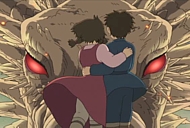
Gedo Senki AKA Tales From Earthsea
No one should have to live up to their father's reputation. While I hope my sons have good careers that they love when they grow up, I pray that they don't feel the need to follow in my footsteps (or reject them out of hand, either). The business between fathers and sons is a tricky business already, and all the more when your father is considered one of the very best in the world at his chosen profession.
That's what Goro Miyazaki faced in directing Gedo Senki, based loosely on stories from the Earthsea universe created by Ursula LeGuin. (While its official English title is Tales From Earthsea, it's a bit of a misnomer since the film's characters don't even appear in the book of that name.) Not only was it Goro's first movie -- and not only was it a move out of his career path as an architect -- but the film had to stand next to his father Hayao Miyazaki's works. You might ask if it's even fair to bring up the master Studio Ghibli head when reviewing Gedo Senki. It's not. But if it was Goro's intent to disinvite comparisons between himself and his dad, he didn't succeed, for his creation is shackled to his dad's oeuvre by many of his own choices. That makes it difficult to judge Gedo Senki solely on its merits or lack thereof. Because while it is a good film, at times even a beautiful and haunting one, it is not a great one, and while it is perfectly palatable fare, it lacks the spark that makes better anime films shine.
Arren is a deeply troubled young man. Once a prince, he has murdered his father and fled the kingdom. In danger from real wolves and human ones -- slave traders -- Arren finds help in the form of a mage named Sparrowhawk. Sparrowhawk doesn't know Arren's full story, but he befriends the youth and takes him under his proverbial wing. It seems that things are strange all over the world...a spiritual balance has tipped, and it can be seen in everything from the evil spreading throughout the land to the appearance of dragons in deadly combat. While perhaps Arren's irrational behavior could be explained by the state of Earthsea in general, his psyche is deeply awash in shame and guilt and regret. He begins to open up as Sparrowhawk takes him to meet Tenar and her scarred but beautiful ward, Therru. But there is far deeper danger awaiting them, as Sparrowhawk's old nemesis Lord Cob desires the mage's magical powers and revenge for disrupting his slave trade...and his plans may destroy the balance of Earthsea forever.
As you might expect from a Ghibli picture, it's a lovely looking film. It's well animated, and many sections are just a pleasure to watch. However, there is a certain level of intricate detail missing that would have made the film stand out. This is particularly noticable in the character designs, which are by far the most plain element in the movie. I can't imagine why our heroes have such a sameness to them, even in terms of texture. Even secondary characters in other anime have more physically interesting characteristics. Strangly enough, it's the villains who get the most memorable renderings; the henchman Hare stands out because of his unique cheshire Lupin-esque grin, and Lord Cob's bizarre androgyny is vile but interesting.
Visually, though, the film is most hurt when compared to the elder Miyazaki's porfolio. While other animators under the Ghibli label like Isao Takahata place their own recognizable stamp on a movie, this one resembles more a Hayao clone. Goro's inability to make the visuals his own, as impressive as they sometimes are, hurts his ability to stand on his own. But while the character design is fair at best and the artistic palatte pays too much homage, the one thing that stands out is the dynamic and moving score. It's proof positive that an awesome soundtrack can make a good film a lot better. While I might not have thought it was the most stunningly rendered film, the music gave it a needed extra "oomph."
Now I want to make it very clear that I have neither read any of the Earthsea books nor anything by Ursula LeGuin. But I can tell you this much: if you have, you're going to be disappointed. I say that not because of anything fans of the books have said or even LeGuin's own comments about the movie. It's because this film can't be a good representation of a seminal sci-fi/fantasy classic. It's not epic enough. I mean, you could complain that the original Star Wars is nothing more than Joseph Campbell's hero mythology writ large in space, but there you had an interesting cast of both heroes and villains that aided and antagonized the hero on his journey. Gedo Senki is too small. We're told that the events that are unfolding will have a dramatic-scale impact, but we don't see it, and that's the first rule of filmmaking: don't tell what you can show. While some of the sights along the journey are neat to see, it feels like we are only privy to a tiny little sliver of this world. In Star Wars, you felt like you'd been on Tatooine, you felt like you'd stormed the corridors of the Death Star and flown in a smuggler's derelict freighter. But I kept craving something that would make the world of Earthsea stand out, and except for its dragons, it doesn't.
On the positive side, I was drawn to Arren and his plight. He is a much more disturbed and unhinged character than virtually anyone in the Ghibli universe, and the fact that he's a hero (in comparison to a heroine) is unique as well. I wasn't sure what he was going to do or how his character arc would work out. I liked that about him, and while he is surrounded by stock characters in many of the other roles, he is a bright spot. While Therru is underdeveloped, I did like her interplay with Arren and found that they both worked best when they were interacting. Many of the smaller character-driven moments rang true. I think it proves my ultimate belief that Goro Miyazaki might be quite adept at directing smaller, more personal pieces rather than "big" movies where we expect magic every few minutes. But "big" is just what Gedo Senki is, and whereas the small moments are quite nice, it's never big enough to be something truly special.
What it also lacks is a sense of humor. Rarely have I seen a film that is so bereft of any comic relief. Even your most hardened war films have lines that crackle with a little wit. We know that Earthsea is a place where the balance between good and evil has fallen apart, but did it have to take even a moment of frivolity with it? While it's usually violence or nudity or foul language that make a film inappropriate for children -- and the film does have some violence, let there be no doubt -- the humorlessness of the story will drive away younger viewers who (rightfully) like to enjoy the movies they see. It's not that Gedo Senki needed a talking dog or some of the ridiculousness of current childrens' films; it just needed something to make it a little less deadly serious.
It's hard for me to truly put together a balanced take on Gedo Senki. Because the truth is, I liked it while I watched it. I didn't love it. I admired bits of it. I thought that had it been a film put together by some fledgling anime studio, I would have been pretty impressed. I would easily watch it again. But there's also nothing here that makes me think that somebody's anime viewing would be somehow lesser for not having seen it. What I think it is lacking, ultimately, is charm. Having seen only the teaser for Ponyo, a movie that held little interest for me before seeing the trailer, I can say that there is more that made me smile in those two minutes than all of Gedo Senki. Earthsea is interesting, but it sure ain't fun, not in the everyday sense. And while I'm tempted to give it a better grade because I did enjoy viewing it, I realize that I'll be buying the CD before the DVD of Gedo Senki. So see it...you'll probably like it too, at least on a surface level. But be prepared that if you're waiting for the next masterpiece from somebody with the last name of Miyazaki, this isn't it.
Gedo Senki AKA Tales From Earthsea -- violence -- B

